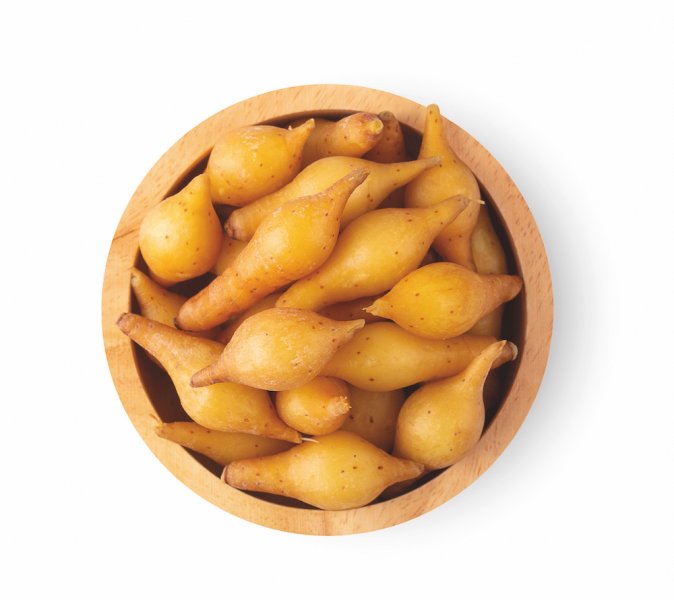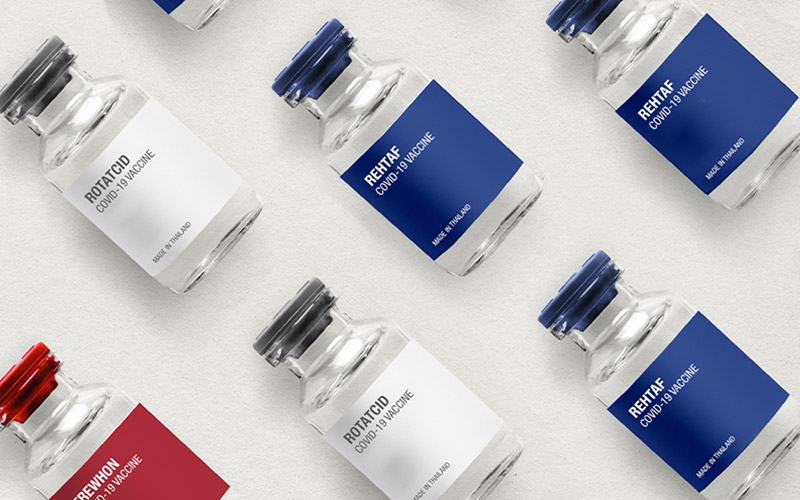If there’s one thing the pandemic has taught us, it’s not to put all our eggs in one basket. Most countries have faced some kind of delays, shortages, and disruptions to vaccine supplies and Thailand has been no exception. But as the country steps up its rollout, with around 90 percent of Bangkok now jabbed, local scientists are still racing to produce vaccines of their own to ensure a steady supply of booster shots for when they might be needed. Here are some of the most promising Thai projects vying for a slice of the vaccine market that could knock leading brands off the shelf.
Chulalongkorn’s MRNA Vaccine
If approved, Chulalongkorn University’s Chula-Cov 19 vaccine would be the first mRNA vaccine developed and produced in Thailand, and possibly in Southeast Asia. The university began Phase 2 trials on 150 volunteers last month after seeing promising results in the first phase. The vaccine, which uses the same technology as Pfizer and Moderna, tells the body to produce a protein which then triggers an immune response.
Kiat Ruxrungtham, who is leading the study, said the vaccine is able to induce a strong response in T-cells, which are what fight the virus. The vaccine has recorded 94% efficacy, Kiat says, putting it on par with the other leading mRNA shots. They believe it will be able to successfully suppress the four main coronavirus strains: Alpha, Beta, Gamma, and Delta. Kiat hopes the team’s vaccine can be approved for emergency use before April.
Baiya Phytopharm’s Tobacco Vaccine
Few plants get such a bad rap as tobacco, but if the clever scientists at Baiya Phytopharm are successful, that could change. Founded in 2019 by Waranyoo Phoolcharoen, an assistant professor in Chulalongkorn’s department of pharmaceutical botany, the company began manufacturing plant-based ingredients for use in things like cosmetics before turning its hand to vaccines shortly into the pandemic.
Phassorn Suwatsrisakul, Baiya’s project manager, said after a sticky start the company is seeing encouraging results. “We did so many experiments and failed a lot, but then we managed to make antibody test kits and thought it would be good to take the next step and actually make a vaccine.”
The company’s vaccine, Subunit, is made from tobacco plants low in nicotine that are imported from Australia. At five weeks, the plant is injected with bacteria carrying the coronavirus DNA, triggering an immune response. Once it has produced as much protein as it can before succumbing to the virus, the protein is removed and used as the main ingredient for the vaccine.
One of the key features of Baiya’s vaccine is that it may have less side effects than an mRNA shot. “The protein is not harmful. Our vaccine is essentially comprising the protein that the mRNA vaccine is going to produce,” Phassorn says. “With mRNA [vaccines], it has to change into the protein and the protein can activate your body to produce antibodies.”
GPO Vaccine
While the government is helping to fund the efforts of Chulalongkorn and Baiya Phytopharm, it is also working on a vaccine of its own. The vaccine will be synthesized from egg protein and uses an inactivated strain of the virus. The Government Pharmaceutical Organization, along with Mahidol University and a US-based non-profit organization, started testing its vaccine on humans in March 2020 and launched the second phase on 250 volunteers aged 18-72 in August. It hopes to produce 30 million doses annually, starting in the middle of 2021.
Nasal Spray
For those with a phobia of needles, relief might be at hand. The National Center for Genetic Engineering and Biotechnology is working on a vaccine that can be administered as a nasal spray, potentially offering an alternative to the “sharp scratch.”
The spray will work by entering the nose into the mucous membrane of the upper respiratory system where most viruses, including Covid-19, form and into the rest of the body. Clinical human trials in collaboration with Chulabhorn Royal Academy are expected to start at the end of the year, with manufacturing slated for the middle of 2022.

Lizard Blood
No rundown of vaccines would be complete without a mention of one of the projects on the more experimental end of the spectrum. Jitkamol Thanasak, a professor at Mahidol University, is currently carrying out studies on monitor lizard blood as a potential cure for COVID.
The long-haired professor, who’s become something of a celebrity for his love of lizards, having appeared on TV shows cradling the big scaly beasts, fell in love with the animals during a chance encounter some years ago. While in his lab working on diseases in cows, the professor was given a lizard brought in by some students who had found it thrashing around in the canal, seemingly in distress. After spending a couple of days tending to the lizard at a loss for what to do, Jitkamol was amazed to see the lizard cough up the entire shell of a tortoise before swiftly recovering.
“From then on, people started bringing sick monitor lizards to me and so I had to learn about them and do research,” he says.
Jitkamol believes their powerful immune system has the power to fight diseases in humans and has seen positive results of the lizard’s blood on cancer cells. The next step is to try it on COVID before the end of the year, he says.
Alternative Medicine

Complementing Thailand’s research into vaccines are studies into alternative medicines to treat COVID. Amid efforts by the government to promote their use, demand for fingerroot (krachai khao) and green chiretta (fah talai jone) has boomed. But while the herbs have been used for centuries across Asia to treat various infections and ailments, like the flu, their ability to treat coronavirus remains in doubt.
In May, a professor came out to say that his university, Mahidol, which is carrying out research into the root, did not support claims by product advertisers that it can kill COVID in humans. He did, however, say that its extracts were effective in killing the virus in test tubes.
There has been similar confusion over green chiretta. In August, the Department of Thai Traditional and Alternative Medicine pulled its study into the plant from publication due to a statistical error, though the department maintained the herb can help patients with mild COVID symptoms recover. Of course, whether those patients recovered on their own or with the aid of the herb is unclear.
Blinded by science bonus: Thailand’s unique medical experiments
A DOZEN FOR THE PRICE OF 10
In March, the Department of Disease Control (DDC) defended plans to administer up to 12 doses per vial of the AstraZeneca vaccine, despite vials technically containing only enough for 10. Officials said that doctors could use low dead space syringes to extract extra doses. The plan was expected to save the country B1 billion.
MIX-AND-MATCH
In July, health officials gave doctors the go-ahead to mix-and-match Sinovac and AstraZeneca vaccines, citing high antibody counts in their (opaque) experiments. In Sep, Thai officials again okayed the mix-and-match strategy, this time for AstraZeneca and Pfizer shots.
UNDER THE SKIN
Recently, health officials told doctors to inject booster shots under the skin rather than in muscles. By doing this, doctors can get the equivalent of five boosters for every dose administered the standard way, stretching limited supplies to their logical extremes.
VACC 2 SCHOOL
Despite Sinopharm’s vaccine not being approved for use in children under 18, Thailand has begun administering shots to kids aged 10-18 as part of the Chulabhorn Royal Academy’s (CRA) “Vacc 2 School” campaign. It isn’t the first country to do so. China and the UAE have both approved Sinopharm for children 3-17.





Reader Interactions